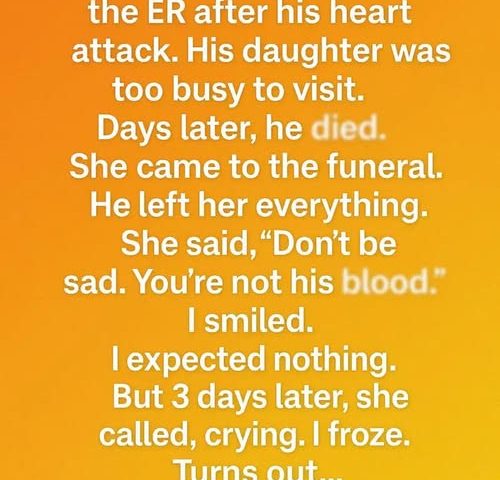I took my stepfather to the emergency room early one cold, silent morning—the kind of quiet that presses on your chest before you understand why. He’d suffered a heart attack at home, clutching his chest and repeating that he was “okay,” even as sweat streamed down his face.
I didn’t debate with him. I helped him into the car and drove straight to the hospital, staying by his side through every scan, every wire attached to his body, every uneasy pause from the medical staff.
His daughter couldn’t arrive right away. She lived several hours away and had responsibilities of her own. I never blamed her for that. Some distances aren’t chosen—they’re simply part of life’s design.
I spent those days at his bedside, listening to the steady rhythm of machines marking every heartbeat. He slipped in and out of sleep, sometimes squeezing my hand, sometimes trying to lighten the moment with weak jokes through the pain.
He rarely spoke of being afraid, but I saw it in his eyes whenever a doctor walked in. I tried to remain calm for him. It felt like the least I could do for the man who had brought structure and patience into my life when I desperately needed both, even if we didn’t share blood.
When he died, everything unraveled in slow, heavy waves. His daughter arrived for the funeral—reserved, quiet, controlled. She acknowledged me with a polite nod, but her eyes held a careful distance.
Át the time his belongings were discussed, she reminded me, kindly but clearly, that I wasn’t his biological family. Everything had been left to her. I accepted that without bitterness. I felt no sense of entitlement. My place in his life had never been about inheritance. The grief itself was burden enough.
Three days later, my phone vibrated with her name. I nearly ignored it, assuming she needed a hospital detail or paperwork. But when I answered, all I heard was her sobbing—real, unguarded grief. I stayed quiet, giving her space to steady her breathing.
She told me that while searching through his things for documents, she’d discovered an old photo album hidden at the back of a closet.
Tucked between two pages was a letter. He had written it weeks before the heart attack, long before either of us imagined how close the end truly was.
She said she’d opened it expecting something simple—maybe a memory or a short note. Instead, she found a confession of the people who mattered most to him.
Then she began to read.
He wrote that life had taught him, late but clearly, that family is not defined by blood alone. It is shaped by presence, by care, by quiet consistency when no one is watching.
He wrote that I had given him stability when he felt himself faltering, companionship when loneliness closed in, and dignity when his health began to fail.
He admitted he had never said these things to my face because he didn’t want to weigh me down with sentiment—but he wanted someone to know.
As she read, her voice softened. The distance I had once heard vanished. She told me she’d never fully understood the bond between her father and me.
She knew I helped in practical ways, but she hadn’t realized how deeply he treasured the comfort and steadiness I brought him.
Hearing him describe me as a source of peace shook her view of everything—especially the way she had treated me after the funeral.
She apologized—not out of obligation, but with genuine understanding. She explained that grief had clouded her reactions and narrowed her vision. The letter had shifted something inside her that nothing else could. It wasn’t about money or belongings. It was about seeing the truth of who had stood beside her father in his final days. We agreed to meet later that week.
There was no tension left, no need for confrontation—just two people trying to move forward with honesty. We barely spoke of the painful past. Instead, we focused on what her father would have wanted: mutual respect, and perhaps something gentler growing between us. His words had softened the edges of our grief and made space for understanding.
When we met, she brought the letter with her and placed it in my hands. For a moment, the room felt suspended in stillness. His handwriting—familiar and slightly uneven—looked just like it did on every birthday card he’d ever signed.
Reading his words myself made the weight of them settle deeper, but they also grounded me. They reminded me that showing up for someone matters, even when it feels unseen. That afternoon became a turning point.
We shared stories about him—his stubborn streak, his dry humor, his insistence on doing everything the old-fashioned way. We realized how many moments of his life we had each witnessed separately.
In a way, the letter became the bridge he must have hoped we would one day cross together.
In the weeks that followed, she called me often—not from duty, but from a genuine desire to stay connected. We sorted through his belongings side by side, making decisions calmly and thoughtfully. Sometimes we laughed at the things he had saved.
Sometimes we had to pause when the weight of memory became too heavy. But we faced it together—not as strangers bound by loss, but as two people honoring the man who linked our lives in his final years.
His letter did more than acknowledge our bond—it changed how grief lived between us. It reminded us that kindness leaves a lasting echo, that quiet actions carry meaning long after someone is gone, and that relationships built through care can endure even after loss.
In the end, his final words gave us something neither of us expected: clarity, healing, and a shared sense of peace.
And in honoring that, we found the beginning of something new—formed exactly as he believed family should be: through compassion, presence, and a deep, human understanding.
